Practical tips for the start of your studies
Whether you are a first-year student, a student who has changed fields or places of study, or a " newly enrolled" Master's student - the start of your studies at a new university is associated with many questions.
What does it mean to be "enrolled"? Who can I talk to if I have questions about my studies? Where can I find what on campus? What additional offers are there at the university and how can I integrate a stay abroad into my studies? How can I finance my studies? How do I find a flat or room in Erfurt and what do I need to consider? And last but not least: What leisure activities are there?
Here we would like to help answer your questions, provide important information and introduce you to contacts for all aspects of studying at the University of Erfurt. We wish you a good start to your studies!
The student orientation days (STET) take place the week before classes begin. As a first-semester Bachelor student, students from the higher semesters, your student tutors, are there to support you. Organised in small groups, you will learn a lot of interesting and exciting facts about studying and student life in Erfurt.
The first step: matriculation and registration
"Matriculation - registration - is an administrative act by which a person becomes a student and thus a member of a higher education institution."
What may sound so bureaucratic means admission as a member of the university and, at least for first-semester students, is usually the official start to their studies. At the opening of the student orientation days, students are officially welcomed and accepted at the university.
Searching a flat
The start of your studies is usually associated with moving out of your family home and moving to a new city. You can find important information about student housing, finding accommodation in Erfurt and housing costs as well as other tips on our pages about living in Erfurt. The application deadline for student housing at the Student Services Organisation (Studierendenwerk) is 1 April (for the start of the winter semester).
Financing your studies (BAföG & Co.)
Even though the University of Erfurt does not charge tuition fees*, you must firmly plan for certain expenses for your studies per semester. You can find an overview of the costs as well as information on financing your studies on the pages on Costs & Financing. BAfög is paid from the month of application and the month of matriculation** at the earliest. Therefore, it is best to apply for funding as soon as you have been enrolled.
*Exception: Further education Master's degree programmes and degree programmes with certificate qualification
** Matriculation and registration takes place at the beginning of the winter (1.10.) or summer semester (1.4.).
Counselling
The start of your studies marks a new phase in your life in many respects and is accompanied by many changes. Of course, questions are bound to occur. On the following page you will find contacts for all questions about studying at the University of Erfurt.
The third step: Here we go
You can find all important information on the topics of registration and attendance of courses, examinations, legal information, re-registration, change of study direction, grade report, study abroad and Studium Fundamentale in the brochure "My Start into the Bachelor's Programme" or further down on this page.
As soon as you have been accepted for your degree programme, you should carefully read the study and examination regulations, the module handbook and the course catalogue. Here you can find out about the structure of the degree programme, about elective and specialisation options and the required credits. You can also use your subject advice and counselling for your study planning.
Are you studying at the University of Erfurt as part of an exchange programme? Please see the pages of the International Office.
Especially for online teaching, wifi on campus is a crucial requirement. You can install "Eduroam" on your smartphone or PC and then use it free of cost.
University and e-mail account, student ID card
University account and e-mail account

The university has created a university account and an e-mail address (...@uni-erfurt.de) for you . You must activate both separately. To do this, you will need the new user name and initial password specified by the university. You will find this information in the student portal after matriculation and registration. To access it, use your username and password from the application process again.
You can only use the following services once they have been activated:
- ...@uni-erfurt.de-Adresse,
- W-LAN access Eduroam,
- Information and lending services of the Erfurt University Library,
- Moodle teaching and learning portal,
- Wiseflow examination portal.
After activation, you can retrieve your enrolment certificates at the address in the student portal.
We would like to ask you to use only your university e-mail address for your communication with the university from now on. You can access your e-mail account via quicklinks/mail systems and via webmail.
Important links:
Study and examination portal E.L.V.I.S.®
In the study and examination portal E.L.V.I.S.® (Erfurter LehrVeranstaltungs- und InformationsSystem) you will find all courses that have been created for your studies in this semester under My courses (course catalogue).
When you register for courses and module examinations via My E.L.V.I.S.® - Services: My grades, study account as a grade overview or study report. Towards the end of the semester, you can also access your grades here.

Student identity card (thoska)
The Thüringer Hochschul- und Studentenwerkskarte (thoska) is a multifunctional card that replaces various card systems (library card, payment function, copying cards, access, etc.) and serves as identification in the university area. Don't forget to validate your student identity card (thoska) on your first visit to campus at the machines provided for this purpose.
Information on the student identity card (thoska) and the validation stations
Student advice and counselling: support in everyday student life
Student advice and counselling is offered by various offices within the university. Do not hesitate to ask your questions, we will be happy to help you.
1. mentoring (major subject)
A mentor (Professor or academic staff of the major subject) is responsible for advising you during your Bachelor's degree programme. You either choose this mentor at the beginning of your degree programme or he/she will be assigned to you. You will find out more during the Student Orientation Days. You can discuss your study and enrolment plan for the major subject with your mentor. He/she will be available to answer any questions you may have about specialisation, internship planning, stays abroad, etc.
2. subject advice and counselling for the minor subject
The subject advice and counselling complements the mentoring in matters relating to the minor subject: content, specialisations, study and examination regulations, study and examination plans, performance requirements and certificates and the recognition of previous academic achievements (e.g. when changing degree programme and/or university).
3. examination matters
Information on examination matters, examination regulations, assignments, sick notes etc. as well as confirmation of already recognised achievements for the BAföG office can be obtained from Department 1: Registrar's Office.
by telephone: Monday to Friday 9-11:30 a.m.
4. student affairs
Information on application, admission, enrolment, change of subject, re-registration, leave of absence, long-term study fees, etc. can be obtained from Department 1: Registrar's Office.
by telephone: Monday to Friday 9-11:30
5. general student advice and counselling
The general student advice and counselling service provides information and advice on the various degree programmes, helps you get started with your studies and with any difficulties that arise during your studies and supports you in your entry into professional life. It cooperates with the career counselling service of the Federal Employment Agency.
by telephone: Monday to Friday 9-11:30 a.m.
6. diversity officer
If you are restricted in your studies due to a disability or chronic illness, Department 1: Registrar's Office can advise you on behalf of the Diversity Officer. You can get support here, especially on the subject of compensation for disadvantages. These should be discussed at an early stage so that the university can react accordingly. Please inform yourself in advance about
Studying with disabilities and chronic illnesses.
7. Student Council
The Student Council also offers help in all student matters as the representative body for students enrolled at the university.
Language skills

Learn foreign languages and expand your knowledge
A command of foreign languages is required or recommended for some subjects . The exact requirements can be found in the respective examination and study regulations for the major or minor subject.
In order to participate in language courses from level A2.1, you must take a language placement test . The Language Centre offers these tests in the two weeks before the start of lectures, i.e. also during the Student Orientation Days.
Further information:
Registration for language courses at the Language Centre
Placement tests for language courses
Structure of the study programme

"European Credit Transfer and Accumulation System (ECTS)
The European Credit Transfer and Accumulation System (ECTS) enables the standardised assessment of academic achievements in Europe. The quantitative workload of the modules is decisive, so that the more time-consuming a module is, the more credit points are awarded. The entire workload from courses to follow-up work, self-study, examination preparation through to the examination is included in the assessment.
Expected time required per semester/credit point
The university expects you to spend an average of 900 hours per semester studying and taking examinations in a full-time degree programme. This is comparable to a full-time job of 40 hours per week. The expected workload is expressed in 30 parts, the so-called credit points (CP). There are 30 hours per credit point. This corresponds to the "European Credit Transfer System" (ECTS), i.e. one CP is also one ECTS credit. In the first year of study, courses with a weighting of 3 CP are the rule, i.e. you can expect ten double-hour courses.
Examination and study regulations, module descriptions
Examination and study regulations, module descriptions
All questions regarding your studies can always be answered with your examination and study regulations (PO) as well as the attached module descriptions (module catalogue) plus the Framework Examination Regulations (RPO) .
The examination regulations that apply to you are listed in your certificate of enrolment , which you can access via the student portal.
Section 1 of the examination regulations refers to the Framework Examination Regulations (RPO) applicable to your degree programme, which contain the overarching regulations for all examination regulations. Colour-coded module lists serve as a table of contents and overview of the module catalogue. The module level is marked in red and the sub-module level in blue.
It is best to print out your examination regulations and the module lists, as these will accompany you during the Student Orientation Days and throughout your entire degree programme.
Important links:
Courses offered - Course catalogue
Create timetable
My timetable in three steps
Three steps to the timetable:
- In the examination regulations , you can read which modules you must complete and which can be completed in order to successfully complete the orientation/qualification or Master's phase. This is specified in the examination regulations in the section on the "Structure of the degree programme" (usually Section 4 or 5).
- A module is usually completed when the module examination has been passed or recognised. Which sub-modules you must have attended for the module examination can be found in the module descriptions, which are attached to the examination regulations. A few modules are completed without an examination (MoP).
- Once you have decided which modules you will complete with which sub-modules, select the courses assigned to the sub-modules under My courses (in the course catalogue) before each semester and transfer them to your timetable with the university lecturer, title and sub-module identifier (e.g. M01#01).
Important links:
Registration and attendance of courses

Registration and attendance of courses
You are guaranteed the opportunity to attend compulsory courses in your degree programme, while attendance at compulsory elective courses may generally be limited to a certain number of participants. In these cases, the faculties offer registration procedures , for which you will be informed in the course catalogue or in the courses themselves. The lecturers decide on admission to the course in the first two sessions.
Registration and examination registration
Registration, examination registration
Once the registration for the selected courses has been clarified with the lecturer in the first and second week, you must register via E.L.V.I.S.® within the third and fourth week of lectures in order to register for the courses and module examinations.
Registration via E.L.V.I.S.® will be explained to you during the Student Orientation Days. Please only submit your online enrolment once you have completed your enrolment planning, as this is binding and cannot be changed!
Important links:
Module examinations and examination dates

Module examinations and examination dates
The lecturers will inform you about the module examinations and module dates in the first two weeks of lectures. You should also enter expected tuition fees and their dates (Section 8 (4) B-RPO and Section 9 (4) M-RPO) in your timetable at the beginning of the semester. Module examinations are also scheduled during the lecture-free period.
Please note that you will only be admitted to retake a module examination if you have attended the first examination date. According to the framework examination regulations, examiners are obliged to enter module examination grades, i.e. also the grades of the repeat examination if applicable, in E.L.V.I.S.® by the beginning of the lecture period of the summer semester or by the end of the first half of the lecture-free period after the summer semester at the latest.
Orientation phase (1st - 2nd semester)
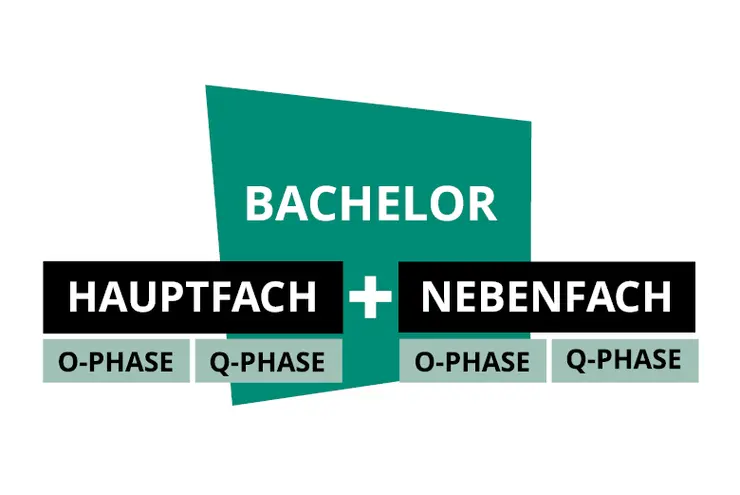
Orientation phase (O phase)
The first two semesters of your degree programme at the University of Erfurt are known as the orientation phase (O-Phase) . During this time, you can explore the study system, familiarise yourself with the study and examination regulations and test their application.
The module examinations (MP) of the O phase must be passed. If you are unsuccessful at the first attempt, you can repeat them once in the same semester at a second examination date.
After completing the O-Phase, you have the option of changing your subject. Please submit your application in writing to Department 1: Registrar's Office. If you would like to change to a subject with restricted admission, please remember to submit your application for admission by 15 July at the latest (cut-off deadline).
After successfully completing this phase, you can move on to the qualification phase (Q phase, 3rd-6th semester). In this phase, you will deepen your knowledge of the course content and set your personal specialisation. The Q phase ends in the major subject with the completion of your bachelor's thesis.
Re-registration (semester contribution)

Re-registration: Payment of the semester contribution
In order to continue your studies, you must re-register each semester. To do this, you must pay the fees and contributions associated with your studies. The exact amount, bank details and reason for payment will be sent to your university e-mail address at the beginning of the re-registration period. Your payment then counts as an application for re-registration.
The re-registration period for the summer semester runs from 1 January to 15 February and for the winter semester from 1 June to 15 July. Please bear in mind the processing times of your bank! If the amount is not credited to our account until after the last day of re-registration, a late payment fee of 20.00 euros will be charged. You can only be re-registered once the late fee has also been received.
Once payment has been received in full, you will receive an e-mail informing you that you have been re-registered and that you can print out your certificate of enrolment in the student portal. You must also extend the validity period of your student identity card (thoska) at the validation machines provided for this purpose.
Please apply forchanges to your name promptly online via the student portal and upload the relevant documents to the portal. You are obliged to keep your contact details (address and please also your telephone number) up to date in the student portal. You can make these changes yourself.
Important links:
Semester calendar (dates)
The ‘International Community Forum’ on Moodle offers international students a bilingual platform to exchange ideas and learn from each other. Here, experiences can be shared, solutions found together and mutual support offered. We also collect frequently asked questions and provide the relevant answers directly in the forum. All students have the opportunity to register in the forum via Moodle, access the information provided, ask their own questions or contribute helpful answers and materials such as forms or translations.
The enrolment key is: forum.
The fourth step: thinking outside the box
Of course, studying does not only consist of lectures, seminars and examinations. There are also numerous events and offers that enrich everyday study life.
Language courses, sports and engagement
Studying is the perfect time to immerse yourself in a new language or deepen your existing knowledge. But there are also plenty of other opportunities at the University of Erfurt to actively shape your student life – whether in university groups, through sports or by participating in various committees. Here you can have your say and help make decisions. You can find an overview of all our offerings here:
Have your say, help shape the future – your involvement in the committees
Learn and improve languages during your studies
University groups & student initiatives
Study or internship abroad
Whether you want to organise your semester abroad individually or are interested in studying at one of the University of Erfurt's partner universities - the following information will help you on your way to studying abroad.
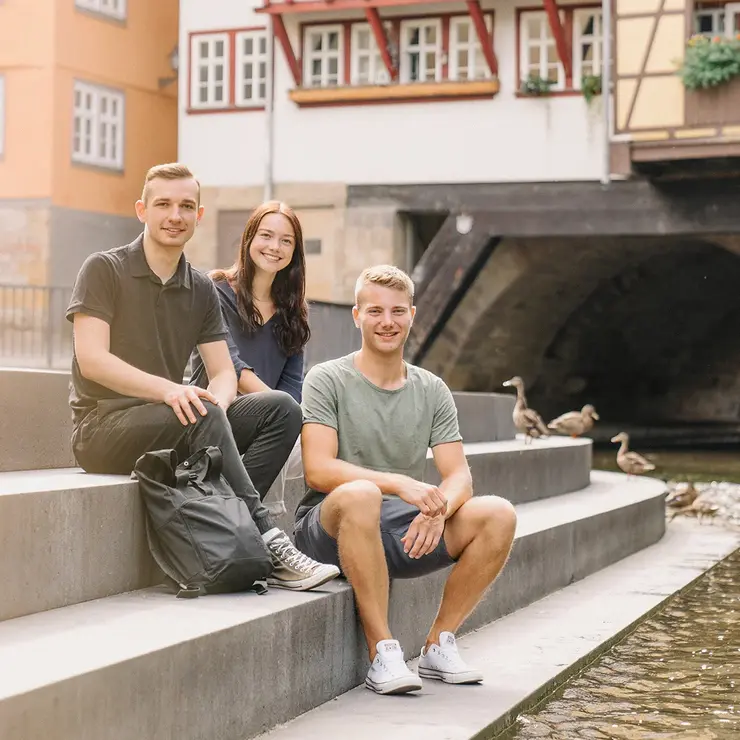
Get to know the campus, Erfurt and Thuringia
Already curious about the university complex? Then take a look at our campus virtually or on site. Take advantage of the semester ticket and get to know all facets of your city and the region.
Travel through Thuringia with the semester ticket
"Culture flat rate" – free admission to Erfurt's theatres and museums
Podcast episode "Ersties Tips and Tricks (Part 1)" by studi.life.erfurt
Please note: As soon as you start the podcast, personal data is transmitted to Spotify. For more information, please see the privacy policy of Spotify.
Podcast episode "Ersties Tips and Tricks (Part 2)" by studi.life.erfurt
Please note: As soon as you start the podcast, personal data is transmitted to Spotify. For more information, please see the privacy policy of Spotify.
Podcast episode "How to Erfurt (Ersties Guide) by studi.life.erfurt
Please note: As soon as you start the podcast, personal data is transmitted to Spotify. For more information, please see the privacy policy of Spotify.



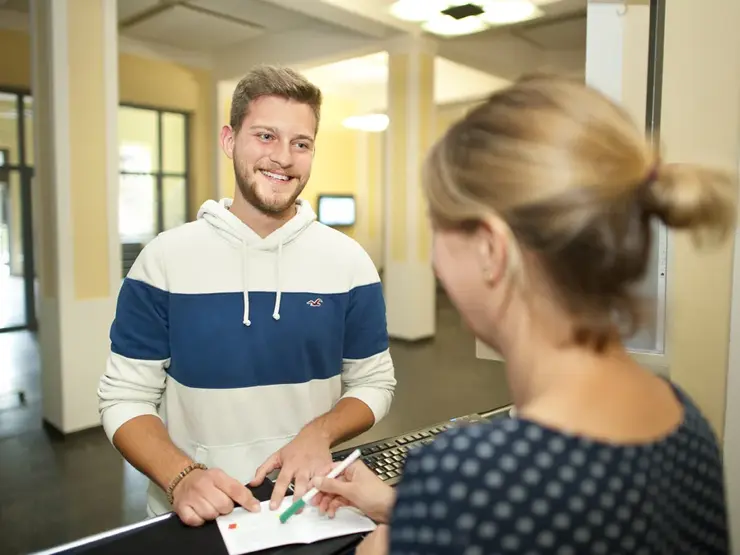
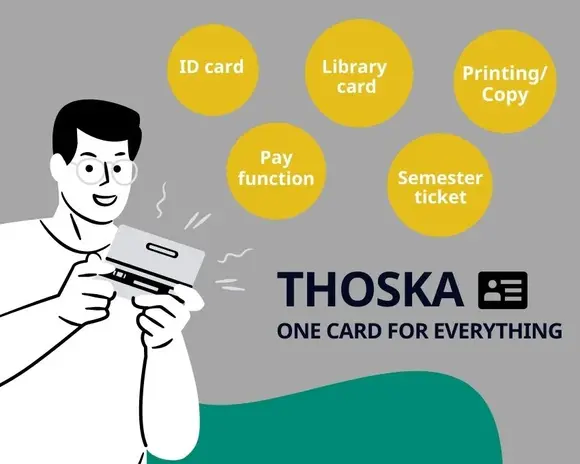
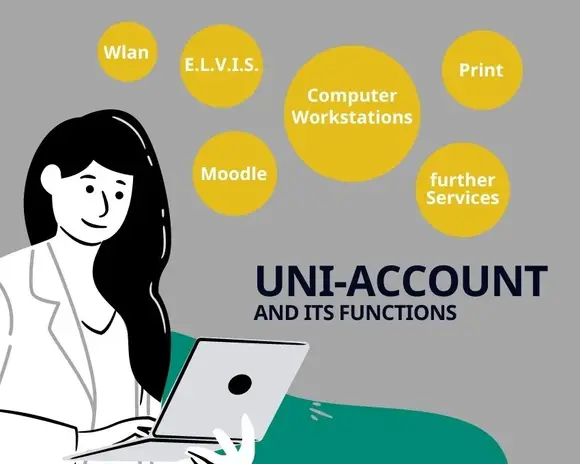

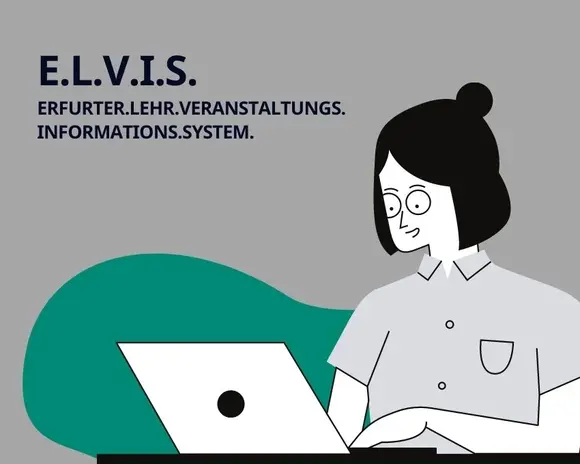
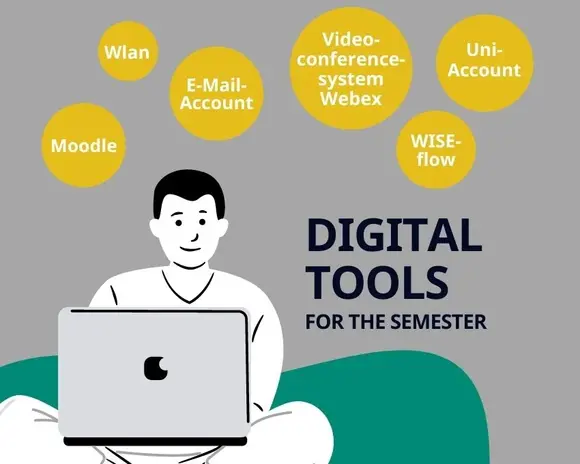
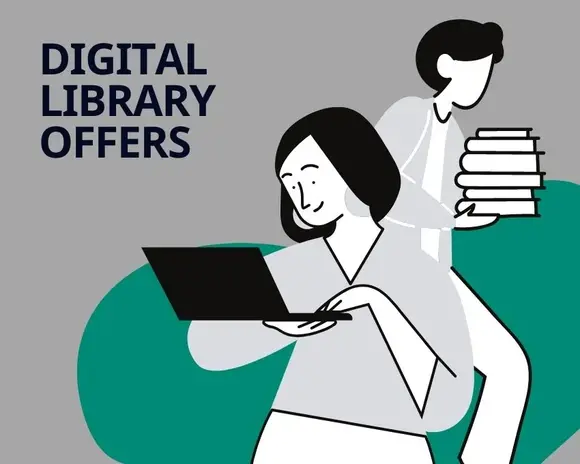



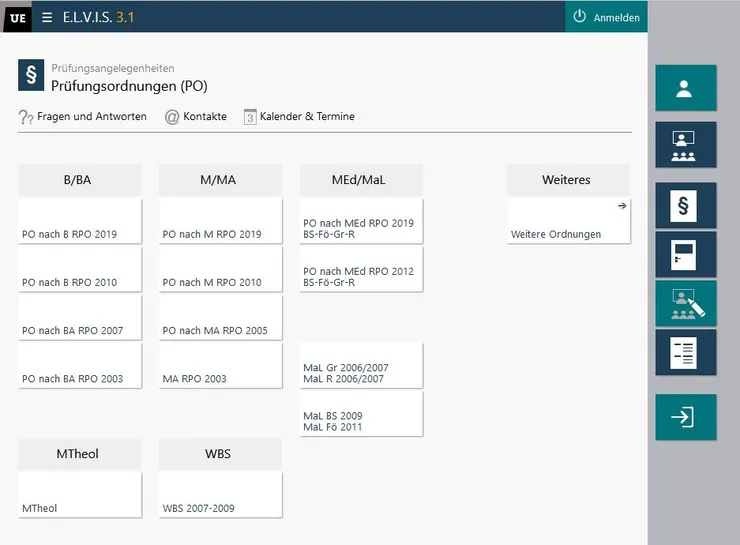
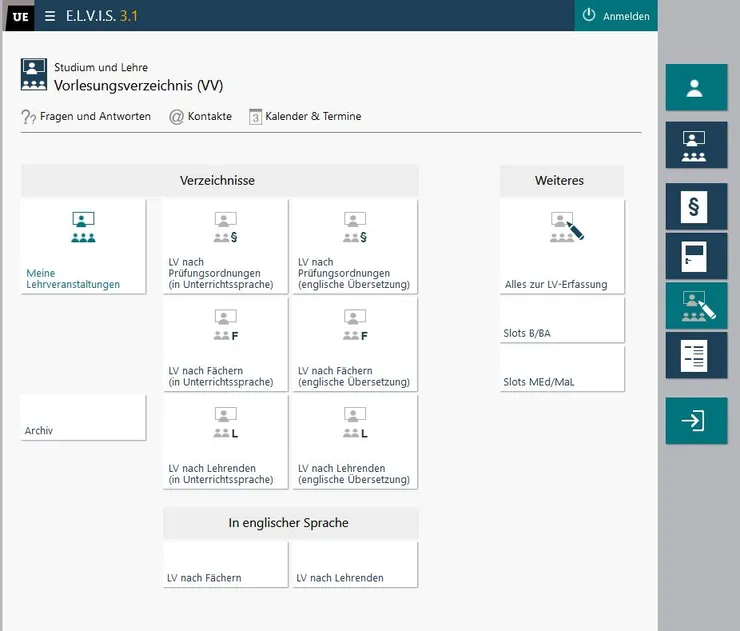


![[Translate to English:] Studierende Brandt Campus [Translate to English:] Studierende Brandt Campus](/fileadmin/_processed_/9/2/csm_Studierende-Brandt-Campus-Uni-Erfurt-11_10e8253467.webp)
![Studentin vor dem Haupteingang der Uni Erfurt [Translate to English:] Studentin vor dem Haupteingang](/fileadmin/_processed_/5/1/csm_Studentin-Haupteingang-Uni-Erfurt_70fdfcdcb6.webp)
![[Translate to English:] GLossar ABC](/fileadmin/_processed_/5/6/csm_Symbolbild_aZ_d86a646de8.webp)
